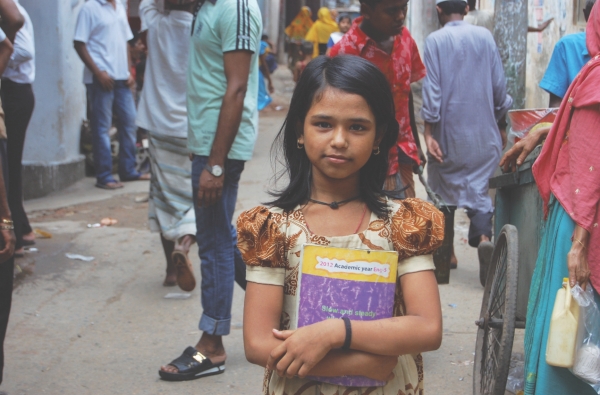| Home - Back Issues - The Team - Contact Us |
 |
| Volume 11 |Issue 40| October 12, 2012 | |
|
|
Perspective
'Because I am a Girl' Maja Cubarrubia and Chemba Raghavan This week governments, international development agencies and people around the world are celebrating the inaugural International Day of the Girl Child, a resolution adopted unanimously last year by the United Nations General Assembly. Many people will ask if we really need another international day to slot in the calendar. We have plenty of official UN days, numerous religious holidays and a greeting card observance for almost every occasion. So why give the International Day of the Girl Child any more thought than all those other days? The answer is simple: we don't pay enough attention to the unique difficulties and specific problems faced by girls, especially girls born in developing countries. We also don't pay sufficient attention to underlying power relations and gender issues within communities. On this day, we speak in one voice together. On this day, we can help spotlight gender issues in our region. We need to face up to these difficulties and find solutions -- real solutions -- that ensure girls have the same chances in life as boys. We cannot allow girls to be forgotten at a time when the development priorities for the next generation are being decided. Every girl should have the opportunity to complete her education and make choices about her future. One-third of girls around the world are denied their right to an education by the daily realities of poverty, violence, discrimination, and child and forced marriages. These girls are missing out on an education right at the time when they have the power to transform their lives and the world around them. This is not only unjust, but is also a huge waste of potential that not only has a tragic impact upon the lives of so many girls, but also far reaching consequences.
Girls are less likely to attend primary school and make up the majority of the 67 million children globally who are not in school right now. Girls are far less likely than boys to go to secondary school and can often find themselves married and running a household by the time they are 14 years old. The risk of maternal mortality is increased when girls become pregnant before the age of 18 because their bodies are not yet mature enough to bear children. Girls who are out of school are more vulnerable to trafficking for commercial sexual exploitation and exploitative labour. They experience more violence and sexual harassment just because they are girls and are more likely to be trafficked, forced into sex work and more vulnerable to contracting HIV and other sexually-transmitted diseases. Giving girls an opportunity for alternative education opens up the opportunity to participate in the job market making them economically viable and not caught in the web and claws of traffickers. Efforts to support girls' education has proven to be one of the best investments we can make to help them escape the cycle of poverty. Simply put, if we ensure girls are given the same opportunities as boys from the moment they are born, we help them and their families break the cycle of poverty, giving them a chance to become empowered women, mothers, workers and leaders. For each year that a girl stays in school, her income will rise by 10 to 20 percent```. With the opportunity to earn a living, she will pull herself out of poverty and bring her children along with her. She will invest what she earns in them -- in their health, education and future. An educated girl is less vulnerable to violence, less likely to marry and have children when still a child herself and more likely to be literate and healthy into adulthood, as are her own children. It is not an exaggeration to say it can save lives and transform futures. Celebrating the inauguration of the Day of the Girl Child, global child-centred development organisation Plan International officially kicked off its 'Because I am a Girl 'five-year campaign on October 11 to support four million girls to get the education, skills and support they need to transform their lives. Plan International is working with girls and boys, communities, teachers, traditional leaders, governments, global institutions, and the private sector to enable girls and boys to participate in decision making and inspire action as well as push for increased funding for girls' education. The goal is to equip schools, to train teachers, to fund scholarships and to influence decision makers so that girls receive both a quality primary and secondary education. We are adamant about seeking an end to child and forced marriage and violence in school, empowering communities to speak out and governments to take action to stop these practices. In Bangladesh, while the constitution guarantees the same legal rights to men and women, gender inequity is still very much pervasive. The discrimination against women is also obvious in terms of accessibility to education. According to Population and Household Census 2011, the illiteracy rate among population aged 7 and above in Bangladesh is 48.2 percent (national). It is 45.9 percent in men and 50.6 percent in women. Economic discrimination is also significant. Though reliable data is hard to come by, according to a report (Rahman 2006), a male's average monthly income is around Tk. 3,894 compared to a female's income of Tk. 2,329. The International Day of the Girl Child -- a day campaigned for by Plan International with support from the Canadian government, the European Union and others -- will focus the world's attention on the importance of girls' rights and create a foundation for advocacy to ensure that girls get the investment and recognition they deserve. Maja Cubarrubia is Thailand Director for Plan International, a child-centred development organisation that has worked with communities and children for more than 75 years. Chemba Raghavan is the Regional Focal Point for the East Asia and Pacific Regional United Nations Girls' Education Initiative, a network of over 25 partner organisations in the region dedicated to promoting gender equality in education.
|
Copyright
(R) thedailystar.net 2012 |

